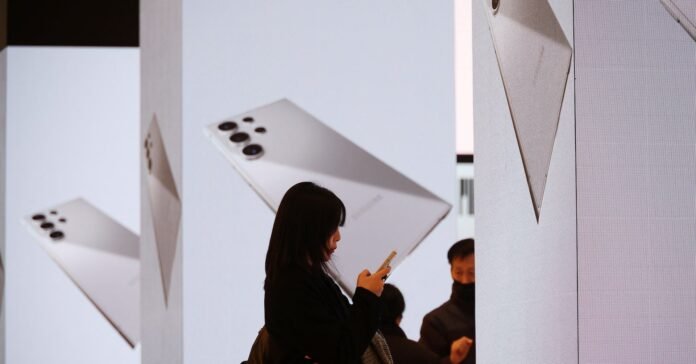“Although there was a delay in commercializing sales of HBM3E as we previously indicated, we have made meaningful progress in the product’s qualification testing process with a major customer,” Samsung Executive Vice President Jaejune Kim told analysts, citing the high-end memory chips used. to make AI chipsets.
“As a result, we expect improved sales (HBM3E) in the fourth quarter and plan to expand sales to multiple customers.”
“Samsung’s comments suggest that the company is expected to finally supply HBM3E chips to Nvidia, overcoming a major hurdle in its HBM business,” said Ryu Young-ho, senior analyst at NH Investment & Securities.
Shares in SK Hynix tumbled as much as 4.6% on Thursday, hit by concerns about the oversupply of HBM chips following Samsung’s comments.
Artificial intelligence is the one bright spot in the sluggish chip market, but Samsung has struggled to supply high-quality semiconductors used in AI chipsets, leaving it more vulnerable to weak demand for traditional chips used in PCs and smartphones.
“In the fourth quarter, demand for memory (chips) for mobile devices and PCs will be weak, but AI growth will keep demand at robust levels,” Samsung said in an earnings statement.
“Against this backdrop, the company will focus on driving sales of High Bandwidth Memory (HBM) and high density products,” the report said.
The world’s largest maker of memory chips, smartphones and TVs also warned on Thursday of limited profit growth in the current quarter due to increasing competition in the consumer electronics segment during the peak year-end season.
Item 1 of 2 A woman uses her mobile phone in front of electronic signs advertising Samsung Electronics’ new Galaxy S24 series flagship smartphones in Seoul, South Korea, January 18, 2024. REUTERS/Kim Hong-Ji/File Photo
Samsung posted an operating profit of 9.2 trillion won ($6.66 billion) in the July to September period, compared with 2.4 trillion won a year earlier and 10.4 trillion won in the previous quarter.
Samsung made a rare apology this month for disappointing earnings, citing “delays” in sales of its advanced chips and rising supplies of traditional chips from Chinese rivals.
SLOW CHIP RECOVERY
Samsung’s chip division rose to an operating profit of 3.9 trillion won in the third quarter, compared with a loss of 3.8 trillion won a year earlier, but that was down from 6.45 trillion won in the previous quarter.
Samsung said chip revenues were hurt by one-time expenses, such as providing employee incentives, and currency effects due to a weak dollar.
“Samsung has not commercialized HBM as effectively as its peers, so its third-quarter performance and fourth-quarter outlook fall short of market expectations,” said Baik Gil-hyun, an analyst at Yuanta Securities.
“It is expected that it will take some time for the company to perform as expected.”
SK Hynix had posted a record operating profit of 7 trillion won in the third quarter, thanks to the sale of AI chips to Nvidia.
Samsung has struggled to compete with rivals not only in its core memory chip business but also in its foundry operations that design and produce logic chips for other customers. Analysts say Samsung’s logic chip business suffered mounting losses in the third quarter.
At Samsung’s mobile devices division, third-quarter operating profit also fell to 2.8 trillion won from 3.3 trillion won a year earlier.
($1 = 1,380.3900 won)
Sign up here.
Reporting by Hyunjoo Jin, Joyce Lee and Heekyong Yang; Editing by Miyoung Kim and Jamie Freed
Our Standards: Thomson Reuters Trust Principles.





